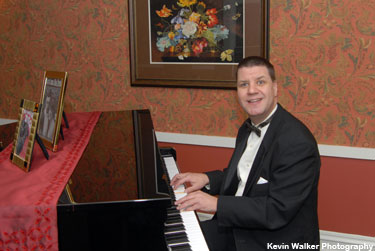Wedding Planning
By Troy Harris
Copyright March 2009
Congratulations on your engagement. As your special day approaches, you will need to decide on your music. Weddings often have a personal theme or style that is shared in the music. Your music is a reflection of you. Planning your music can be a creative and fun adventure rather than an overwhelming task. Here are some suggestions to help in your preparations:
Choosing Your Music
What music do you want played for your special day? It helps to find music that you like. Maybe there is a special song you may want that you have never heard done before but you always dreamed of one day having it at your wedding. Resources you may wish to consider are your friends, family, clergy, musicians, libraries and music stores. You may find attending weddings helpful in your decision making.
Tips on Hiring your Wedding Music
Availability: Are they available to meet with you and work with you on your schedule?
Website: Do they have a full professional website that is up to date? How helpful is it? Do they only offer a web page or Myspace page. Are they listed on any other websites?
Testimonials: Can they provide client testimonials or references? What do they say? Are they in depth and complete with a full name?
Repertoire: How many songs can they play? How diverse are their selections? Do they memorize music? Do they have a song list available to view?
Experience: How many years have they been in the business? What kind of experiences have they had? How has their experiences shaped them to better provide your needs? Do they belong to a professional musician's association?
Learn New Material: Is the band or musician willing and eager to accommodate your needs by learning new songs?
Live Performance: Do they offer a place where you can here them play 'live'? Are they working steady at a regular gig? Do they have a DVD or demo available for your listening pleasure?
First meeting: Do they offer an in person meeting? Are they interested in discussing your needs, likes and dislikes? What impressions do you have of them?
Punctual: Are they prompt in returning emails, phone calls or any meetings you schedule? Do they contact you beforehand if they will be late or need to reschedule?
Wardrobe: What kind of attire do they have? Do they own a tux if the occasion calls for it? Are they groomed in a professional manner?
Customer Service: How willing are they to serve your needs and wants? Do they offer exceptional costumer service? Do they show a good attitude?
Gratitude: Do they thank you for contacting them? Do they show humility and truly appreciate your interest in them?
Contract: Do they provide a professional legal contract signed by all parties involved?
Feedback: Do they welcome and encourage feedback both during and as a follow up after the wedding?
Price: Please notice that price is not the first consideration. A lower price does not mean a bargain as a higher price does not always guarantee quality. Careful consideration of all these areas will help insure your get the most for your money.
Music for the Traditional Ceremony
Prelude Music: The prelude sets the mood and welcomes guests as they enter and are seated.
Parents/Grandparents: This is optional depending on the couple and if there are of parents or grandparents. It is generally a special song. A commonly used song is 'Sunrise Sunset' from the musical, Fiddler on the Roof.
Wedding Party Processional: A single song selection of music. This can be short or often last several minutes as members of the wedding party proceed toward the front of the church.
Bridal Processional: This can be either be a continuation of the wedding party processional or it can be a new song. Either way this is more stately and grand in style. Musical examples of common or popular bridal processional music would include Cannon in D, Trumpet Voluntary or Joy by Bach.
Unity Candle: This can be a time for a song that is special to the couple and is optional in the service.
Communion: Should you choose on having communion or mass, background music or a soloist is often used. 'Ave Maria' is a common during communion.
Recessional: This is festive music which is played following the announcement 'May I introduce Mr. and Mrs.' and as the bride and groom leave. The music is bright and happy, complimenting the processional. The Bridal March is a common recessional.
Postlude Music: As guests are ushered out, music is played for their pleasure.
Additional Wedding Music Planning
Make sure your musicians have the sheet music or recording or other resources to be able to learn and present your music. Many facilities have a piano or organ available. If there is none, make sure your pianist, or organist has one at their disposal or you may choose to rent one. Check to see if the piano is well tuned or in good repair. How often is it tuned? Otherwise you may wish to have a tuning done.

I hope these tips have benefited you in your planning.
Congratulations and best wishes.
Troy Harris
Enjoy with Troy
Copyright by Troy Harris 2009
Articles
How Much Does a Wedding Pianist Charge: A well written article by Kathie Nicolet on Wedding Museum.com

